Bullying
10 Tactics of Anti-LGBTQ+ Pulpit Bullies
The playbook used to shame, silence, and slander LGBTQ+ believers.
Posted November 13, 2020 Reviewed by Gary Drevitch

As Catholic author Karen Armstrong put it, “If your understanding of the Divine made you kinder, more empathetic, and impelled you to express sympathy in concrete acts of loving-kindness, this was good theology. But if your notion of God made you unkind, belligerent, cruel, or self-righteous, or if it led you to kill in God’s name, it was bad theology.”
Of 4.2 million homeless youth in America, 40 percent identify as LGBTQ+. Half report anti-LGBTQ+ religious rhetoric as motivating their homelessness. Yet some pastors continue advancing hateful rhetoric, as if God deems LGBTQ+ people to be so inherently despicable, filthy, and sinful that harming them doesn’t hold the same weight as harming others. Research on the traumatizing effects of conversion therapy has resulted in 20 states outlawing it, and yet 77,000 LGBTQIA+ kids are still subjected to it annually, with a total of 698,000 survivors.
Pulpit bullies usually target those perceived as “different” or “weaker," taking it for granted that these persons won’t speak up about being humiliated, ostracized, and sabotaged, often publicly and relentlessly. Seeing through their hate-sermons and victim-playing makes you doubly vulnerable. Not only do they play God; they also receive constructive feedback as an attack, they feel entitled to respect they haven’t earned, they speak authoritatively on communities and topics after only skimming the surface, and they’re willing to mischaracterize others' identity to preserve their calculated, charismatic persona. You’re just the extra in their self-titled show.
Here’s a playbook of their reactionary and self-deceptive schemes. Many of these tactics mirror those theorized by Marlene Winnell, who conceptualized religious trauma syndrome, as well as red flags mentioned in Churches That Abuse by Ronald M. Enroth, and 33 Signs of Spiritual Abuse, written by Stephen Lambert, author of Charismatic Captivation — Authoritarian Abuse & Psychological Enslavement in Neo-Pentecostal Churches.
1. Dismissing survivors of anti-LGBTQ+ violence as “angry," “negative," or “sensitive." In the words of psychologist Thema Bryant-Davis, “When the house is on fire, we don’t tell people to watch their tone as they yell for help. Be mindful of trying to dictate how people respond to trauma.” Labeling LGBTQ+ people as “too negative” — for not sugarcoating bullying and violence they never deserved — absolves pulpit bullies of a guilty conscience. After LGBTQ+ people respond to hate-sermons by sharing firsthand accounts of anti-LGBTQ+ violence, suddenly pulpit bullies punish them for speaking anything but “love, light, and peace." as if they ever did themselves.
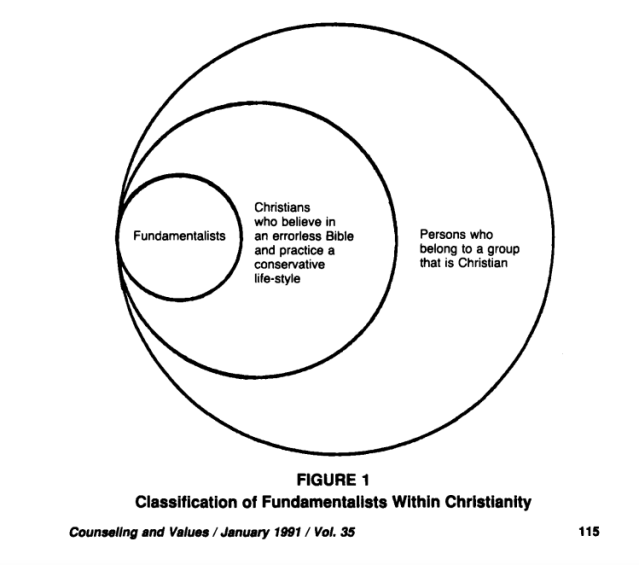
Therapist Whitney Goodman cuts through this “positive vibes only” denial, also known as tone-policing, by asking clients, “Are they negative, or is it hard for you to look at the issues they’re complaining about or discussing? Or do you not like what they’re pointing out in you?”
2. Playing the victim to discredit undeniable evidence of browbeating and playing God. Community organizer and writer Terrance Thomas noted, “Accountability feels like an attack when you’re not ready to admit how your behavior harms others.” After getting checked for their fixation on invalidating LGBTQ+ people, pulpit bullies often play the victim. They’ll publicly downplay and minimize their deliberate, repeated, and unapologetic disrespect — like preaching that God has abandoned LGBTQ+ people, or that LGBTQ+ people represent the Antichrist — but then mischaracterize LGBTQ+ people as angry, “in their feelings" or unstable, for declaring that enough is enough. They might also portray themselves as righteous crusaders under attack, even after LGBTQ+ people have clarified again and again that critiques of anti-LGBTQ+ religious rhetoric aren’t intended to denounce or generalize all churches or pastors, just a harmful practice. They’ll still turn others against those who speak out, still abuse authority to bully LGBTQ+ folks into hopelessness and worthlessness, and still pin the blame any psychological damage inflicted on their target’s “identity crisis."
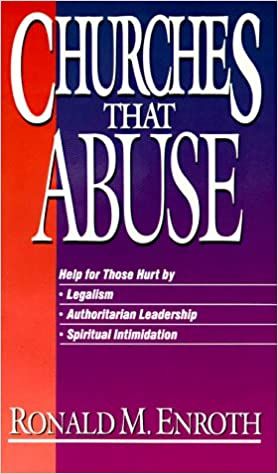
3. Pretending human scribes of the Dead Sea Scrolls conceived every idea or question for all time. Motivational speaker Wayne Dyer once shared, “The ultimate ignorance is the rejection of something you know nothing about, yet refuse to investigate.” Pulpit bullies authoritatively speak on LGBTQ+ issues despite having little to no experience with LGBTQ+ people. Many don’t even live near LGBTQ-affirming groups or organizations. Point out this contradiction, and they’ll likely retort, “Stay in your lane! There is only one truth, God’s Word!” Yet, predictably, this willful ignorance applies only to LGBTQ+ issues. These same folks see no problem with their floor-to-ceiling bookshelves of modern, “secular” works on other contemporary issues. Another word from Bryant-Davis holds true here: “When truth is revealed, we are left with the choices of allowing ourselves to be transformed, or retreating into denial.”
4. Rebuking LGBTQ+ activists as “secular” and “worldly” idolaters, while finessing government benefits and political networks. Civil Rights leader Fannie Lou Hamer famously said, “You can pray until you faint! But unless you get up and do something, God isn’t going to put it in your lap.” Most pulpit bullies agree. When launching their own activist initiatives beyond church walls — community centers, soup kitchens, and shelters — they garner support through “secular” channels, like capital campaigns, public grants, and partnerships with local politicians. Yet, accusations of abandoning prayer, losing faith, and trusting in man’s intellect more than God get hurled at LGBTQ+ activists, whom they label “carnal," “secular," and “worldly." Suddenly, they can’t comprehend “faith without works is dead," and they favor spiritual bypassing, or using faith and prayer as a means to rationalize away apathy and complacency that keeps us, or our community, in a rut.
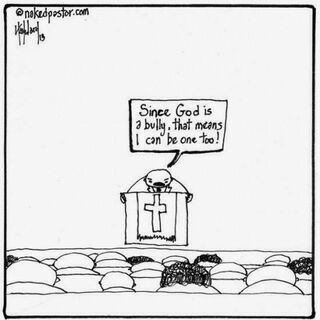
5. Slandering LGBTQ+ Christians as “deceivers," “false prophets," or the Antichrist. As novelist Zora Neale Hurston prophesied, “If you are silent about your pain, they’ll kill you and say you enjoyed it.” Pulpit bullies often lead with an autocratic style, enforcing strict conformity, scorning critical thinking, alienating dissenters, and demanding repentance based on favoritism. Informed and self-secure LGBTQ+ folks, whose strong character and wisdom threatens a pulpit bully’s ego, don’t fare well in this controlling, judgmental climate of double standards. They make too much sense when calling out holier-than-thou doctrine and hypocritical leadership. Instead of learning from LGBTQ+ congregants who can hold their own in discourse about activism, politics, theology, mental health, trauma, and other subjects, pulpit bullies often vilify them as enemies of the Church, booksmart know-it-alls, deceitful prophets, or “lost souls."
6. Obsessing over LGBTQ+ repentance, yet shutting their eyes to anti-LGBTQ+ hatred and violence. As long as weaponized scriptures harm a person or group that an “anointed” pulpit bully deems beneath or below them, they’ll overlook the distortion and manipulation of the scripture to make others feel defective, inferior, or subhuman. Favoritism often dictates whom they believe deserves grace, as they hold LGBTQ+ folks to the strictest standard of repentance. Pulpit bullies don’t see anti-LGBTQ+ murders and violence as sins because they regard LGBTQ+ people as subhuman. In their eyes, a homophobic murderer is more decent than a gay activist uplifting their community. They’ll also never preach repentance to the child abusers who abandon their LGBTQ+ kids. They might even consider denouncing anti-LGBTQ+ violence as “celebrating sin,” as if Jesus condoned hate.
Yet, as the author, Franciscan friar, and spiritual teacher Richard Rohr said of Jesus, “His harshest words of judgment were reserved for those who perpetuated systems of inequality and oppression and who, through religion itself, thought they were sinless and untouchable.”
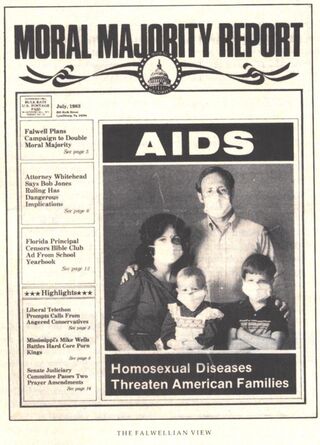
7. Weaponizing delusional, fantastical, unworkable conspiracy theories. For decades, evangelists like Myles Munroe have circulated one of the oldest conspiracy theories — a “gay agenda” to destroy the family. In actuality, LGBTQ+ folks mentor, foster, and adopt the child welfare system’s millions of kids at a higher rate than any other demographic. Not to mention, children of LGBTQ+ parents often perform better in school, and demonstrate empathy and emotional maturity earlier in life.
Another widespread conspiracy stereotypes LGBTQ+ kids as “anti-authority." Yet, in the words of pastor Carlos A. Rodriguez, “You’re only rebellious in the eyes of those who can’t manipulate you.” Research shows that authority figures bully LGBTQ+ young people just as much as peers. A recent study revealed that police harass young Black men perceived as gay at a rate of 42%, more frequently than their heterosexual counterparts. And until 1973, the American Psychiatric Association pathologized homosexuality as "sexual deviance" and "sociopathic personality disturbance."
8. Cloaking and masquerading hate-sermons in code words and metaphors. Cherry-picking scripture to alienate and invalidate LGBTQ+ people can be subtle as it distorts the affirmation of LGBTQ+ Christians as “diluting faith," a la the Doctrine of Balaam, or the “doctrine of compromise." Comparing LGBTQ+ people to the Nicolaitans, whose “sexual immorality” connoted incest and ritual rape, is another tactic. Some commonly used code phrases include “carnal,” “defilement,” “delusional and reprobate,” “double-minded,” “fleshly desires,” “lustful,” “Jezebel spirit,” “unnatural use of the body,” and “vile affections.” Even repeatedly using “a homosexual," instead of "a gay, LGBT, or queer person" can serve to pathologize LGBTQ+ folks as compulsive, sly perverts. Yet, no human being is first and foremost a “___sexual” (e.g., a heterosexual) — first and foremost, we’re all people.
9. Stereotyping LGBTQ+ people as beasts, diseases, insects, vermin, or possessed demons. Dehumanization is the fourth stage of Gregory Stanton’s 10 Stages of Genocide. Dehumanizing a maligned group involves repeatedly equating them with filth, impurity, and immorality, thereby desensitizing others to efforts to humiliate, torture, or exterminate them. Conspiracies and propaganda normalize dehumanization via biased textbooks, caricatured political cartoons, clickbait headlines, extremist campaign slogans, hate radio stations, as well as sermons that scandalize. The dominant group or ruling class manipulates these channels to indoctrinate the masses into blaming a supposedly alien, sub-human minority group for all of society’s ills — in other words, a “gay agenda."
LGBTQ+ people witnessed this recently when a pastor who leads weekly bible study sessions for members of President Trump's Cabinet blamed COVID-19 on gay men “igniting God’s wrath." During the 1980s, it played out when anti-LGBTQ+ evangelicals distorted the early AIDS epidemic into a homophobic punishment from God, and again in 1993, when televangelist Billy Graham said AIDS was a judgment of God. Nevermind that after just 72 hours on the streets, pressure sets in to resort to survival sex for food and shelter, which greatly contributes to HIV/AIDS disparities among LGBTQ+ people.
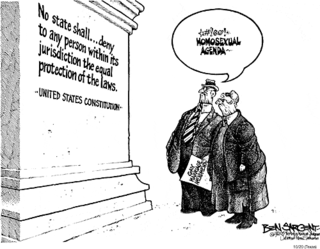
10. Sensationalizing LGBTQ+ acceptance and inclusion as “End Times” or a generational crisis. Martin Luther King, Jr. once observed, “It is appalling that the most segregated hour of Christian America is 11 o’clock on Sunday.” To change that, King tasked his right-hand-man, Bayard Rustin, an openly gay unsung Civil Rights hero, with leading plans for the 1963 March on Washington for Jobs and Freedom. There, King’s "I Have A Dream" speech — attended by 250,000 and aired on ABC, CBS, and NBC — incited momentum for a series of landmark civil rights laws, including the Civil Rights Act of 1964, which desegregated all churches. Even further back, Akkadian and Sumerian texts document transgender priests as far back as 4,500 years ago. And pre-colonization, many Native Americans reserved the special communal roles of counselor, spiritual healer, and storyteller, for each tribal nation’s Two-Spirit citizens.
Queer and trans folks have always existed, yet have endured persistent erasure by societies throughout history. Today, 70 nations hunt and prosecute LGBTQ+ citizens and leaders, and 12 governments have legalized extermination by execution. If a supposed “gay agenda” to brainwash kids by “promoting choice” or “redefining the family” actually did exist, it’d be quite fatal in every region of the world. In America, previous generations of LGBTQ+ trailblazers, many Black and Brown, sacrificed tirelessly to afford today’s LGBTQ+ youth more language, legal protections, opportunities, and representation. Fortunately, they do indeed feel more whole and empowered than ever. Even despite widespread bullying, a greater proportion of their generation accepts them — because when you know better, you do better.
Araya Baker is a counselor educator, suicidologist, and policy analyst. Baker holds a M.Phil.Ed. in professional counseling from the University of Pennsylvania Graduate School of Education and an Ed.M. in human development and psychology from the Harvard Graduate School of Education. Learn more at arayabaker.com.
Related writings by Araya Baker:
- 6 Ways the Church Can Address the LGBTQ+ Suicide Epidemic
- 20 Affirmations and Readings for Those Raised in Anti-LGBTQIA+ Church Families
-
Focus Your Repentance Inward, Not on Antichrist Conspiracies Stereotyping LGBTQ+ Family
- Dear Pastor: Sermons On Queer Folks’ “Delusional”, “Reprobate” Minds Drive LGBTQ+ Suicide




